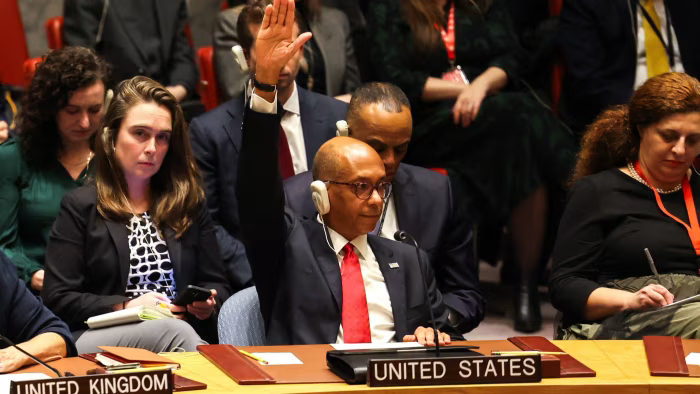
The US vetoed a UN security council resolution demanding an immediate humanitarian ceasefire in the war between Israel and Hamas.
The vote on the draft resolution put forward by the United Arab Emirates underscored the US and Israel’s growing diplomatic isolation, as the Israel Defense Forces continue to press the military effort against Hamas in southern Gaza.
Thirteen security council members voted in favour of the resolution. The UK abstained.
Speaking after the vote, US deputy ambassador to the UN Robert Wood said Washington could not support an unconditional ceasefire, which would only benefit Hamas.
“This is not only unrealistic but dangerous, it would simply leave Hamas in place, able to regroup and repeat what it did on October 7,” Wood said, adding it would “only plant the seeds for the next war”.
The US and the UK also criticised the draft for not including language condemning Hamas’s October 7 attack, in which the group killed 1,200 Israelis and took more than 200 hostages.
The vote came after UN secretary-general António Guterres made use of a rarely exercised power to warn of an impending humanitarian crisis in Gaza and push for a vote on a ceasefire. His use of Article 99 of the UN Charter was the first time the authority had been used in more than 50 years.
More than 17,000 Palestinians in Gaza have been killed in Israel’s air and ground attacks on the strip, which they launched in response to the Hamas incursion in October.
To be adopted, a resolution needs nine votes in favour and cannot be vetoed by any of the five permanent members of the security council.
Arab foreign ministers were in Washington on Friday meeting with US secretary of state Antony Blinken to press him to support the resolution and for the US to do more to bring about an immediate end to the fighting.
“Our message is consistent and clear that we believe that it is absolutely necessary to end the fighting immediately,” Saudi foreign minister Prince Faisal bin Farhan told reporters earlier Friday. “One of the disturbing facts of this conflict is that ending the conflict and the fighting doesn’t seem to be the main priority for the international community.”
Faisal was joined on the visit by the foreign ministers of Jordan, Qatar, Turkey, Egypt and the Palestinian Authority.
